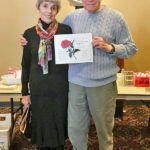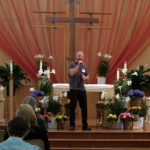A wall-size photograph of the inside of a city bus dominates the entrance to the “Race: Are We So Different?” exhibit at the Putnam Museum in Davenport. Adults of different ages, shapes, sizes and skin color appear in the portrait; a young girl stands in the middle of the aisle, looking straight into the camera. These are ordinary people going about their ordinary lives in the city. The exhibit, created by the Science Museum of Minnesota, “helps visitors understand what race is and what it is not. It gives them the tools to recognize racial ideas and practices in contemporary American life,” the museum’s website states (smm.org/race).
What better time than now — during Black History Month — to visit the “Race: Are We So Different?” exhibit at the Putnam. That’s one option for honoring what President Gerald Ford described in 1976 as the “often-too neglected accomplishments of black Americans in every area of endeavor throughout our history.” That year, our nation’s bicentennial, marked expansion of a black history celebration from one week to a month. The event originated in 1925 to raise awareness of the contributions of African Americans to civilization (africanamericanhistorymonth.gov/about).
Set aside time during February to read about the history, accomplishments and contributions of black Americans in this country. For starters, visit africanamericanhistorymonth.gov; edsitement.neh.gov; smm.org/race. Then visit the U.S. Conference of Catholic Bishops’ website, www.usccb.org to learn about black Americans’ contributions to the Catholic Church. Click on the Black History Month link for a list of resources, including the U.S. bishops’ 2018 pastoral letter against racism.
Titled “Open Wide Our Hearts, The Enduring Call to Love: A Pastoral Letter Against Racism,” the bishops’ letter confronts the issue of racism head on, with a sense of humility, responsibility and call to action. The letter provides much to reflect on this Black History Month.
“To work at ending racism, we need to engage the world and encounter others — to see, maybe for the first time, those who are on the peripheries of our own limited view,” the bishops write. “Knowing that the Lord has taken the divine initiative by loving us first, we can boldly go forward, reaching out to others. We must invite into dialogue those we ordinarily would not seek out. We must work to form relationships with those we might regularly try to avoid. This demands that we go beyond ourselves, opening our minds and hearts to value and respect the experiences of those who have been harmed by the evil of racism.”
Black History Month serves as a reminder to get the dialogue going. On March 19, Our Lady of the Prairie Retreat in Wheatland will host a Lenten soup supper and dialogue with local professionals regarding the experience of racism in their lives and how being white has certain privileges. The event begins at 6 p.m. All are welcome. Register by calling (563) 336-8414 or by email: olpretreat@gmail.com.
Also, keep abreast of Iowa Senate Study Bill 1038 that would ban racial profiling in the state, a legislative priority of the Iowa Catholic Conference (ICC). Go to the ICC website at iowacatholicconference.org to read more about it. Then contact your legislators to ask them to support the bill.
At a time of division and vitriol in our society, it’s important not to lose sight of all that has been accomplished toward Martin Luther King Jr.’s dream, says Jim Collins of the St. Martin de Porres Society. The society, based at Sacred Heart Cathedral in Davenport, helped organize an ecumenical celebration last month honoring the great civil rights leader and his legacy. The society will also make its annual presentation during Black History Month at All Saints Catholic School in Davenport to fifth-graders who also are participating in a Black History Month Essay Competition.
Let’s return to the image of the passengers on the bus at the entrance to the “Race: Are We So Different?” exhibit. Speakers above the image broadcast anonymous voices — male and female — defining race. “Race is black and white,” declares one man. But the exhibit points out that we all belong to the human race. Black History Month is an opportunity to pray and reflect on our shared humanity.
Barb Arland-Fye, Editor
(arland-fye@davenportdiocese.org)











